A Reference Guide for Character Development (Therapy from Quran and Sunnah-1)
A Reference Guide for Character Development (Therapy from Quran and Sunnah-1)
Publisher:
IIPH (International Islamic Publishing House)
Author:
Dr Feryad A Hussain
Language:
English
Binding:
Hard Cover
Pages: 224
Size: 21.5x14.5x1inch
Couldn't load pickup availability
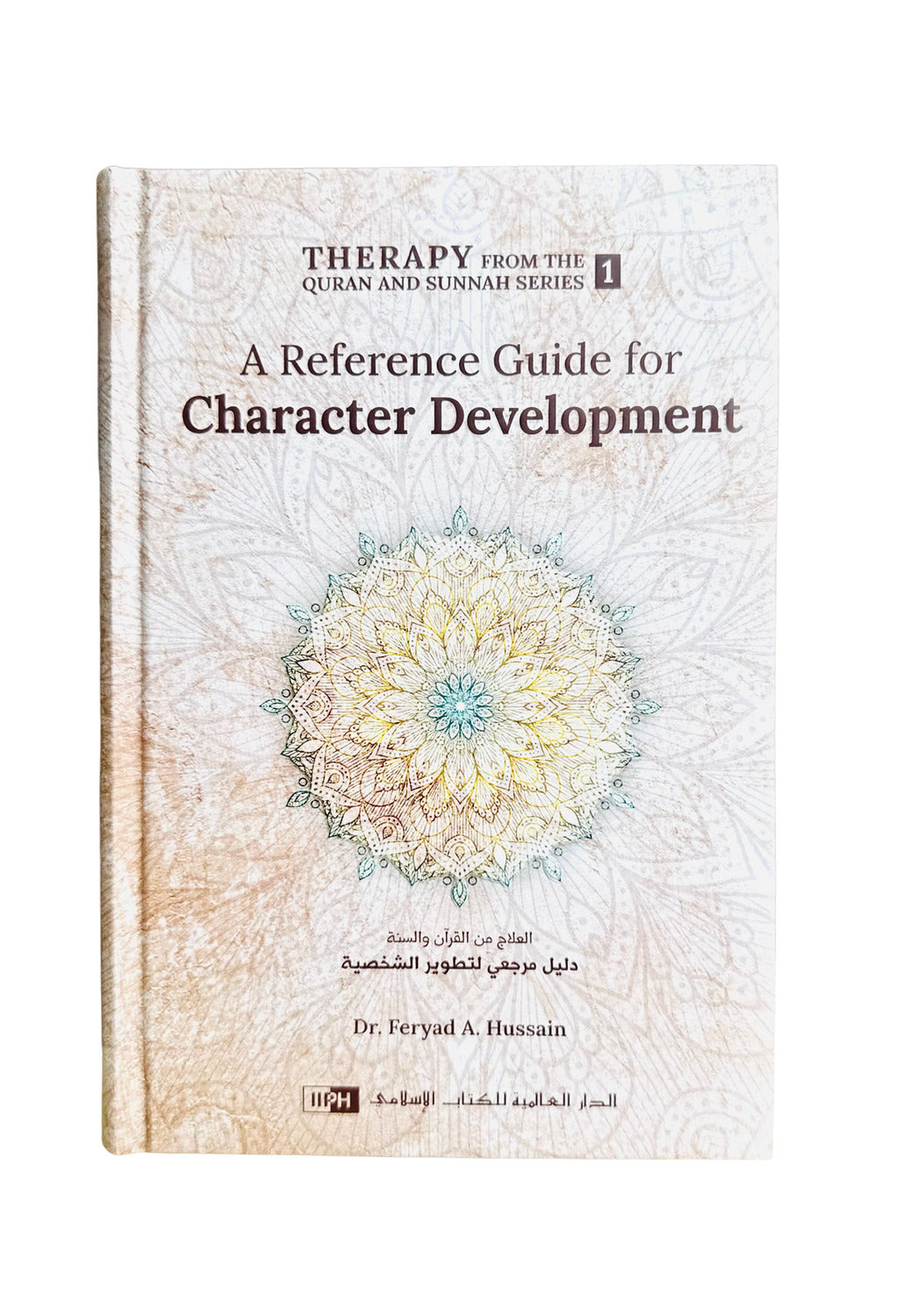
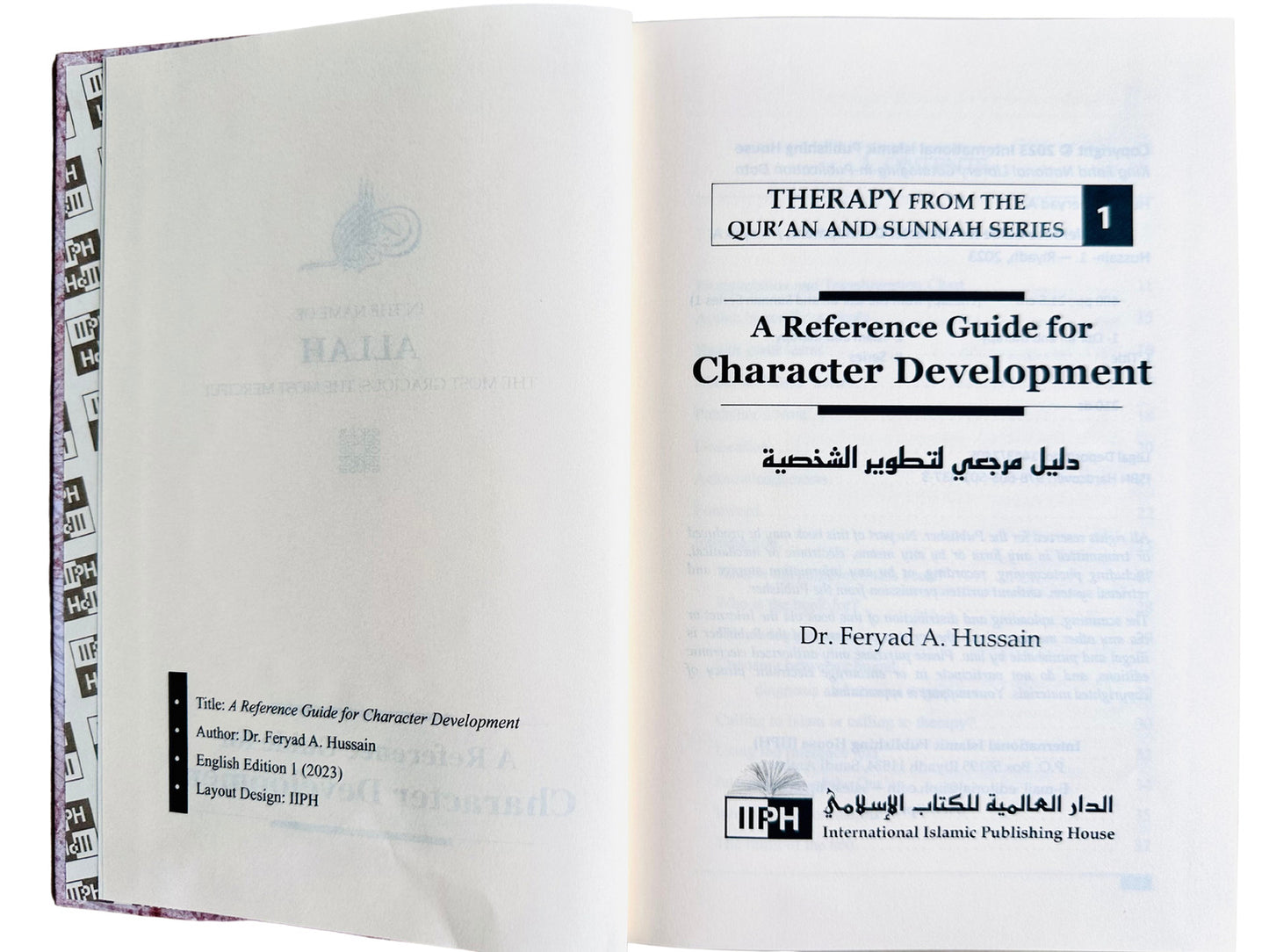
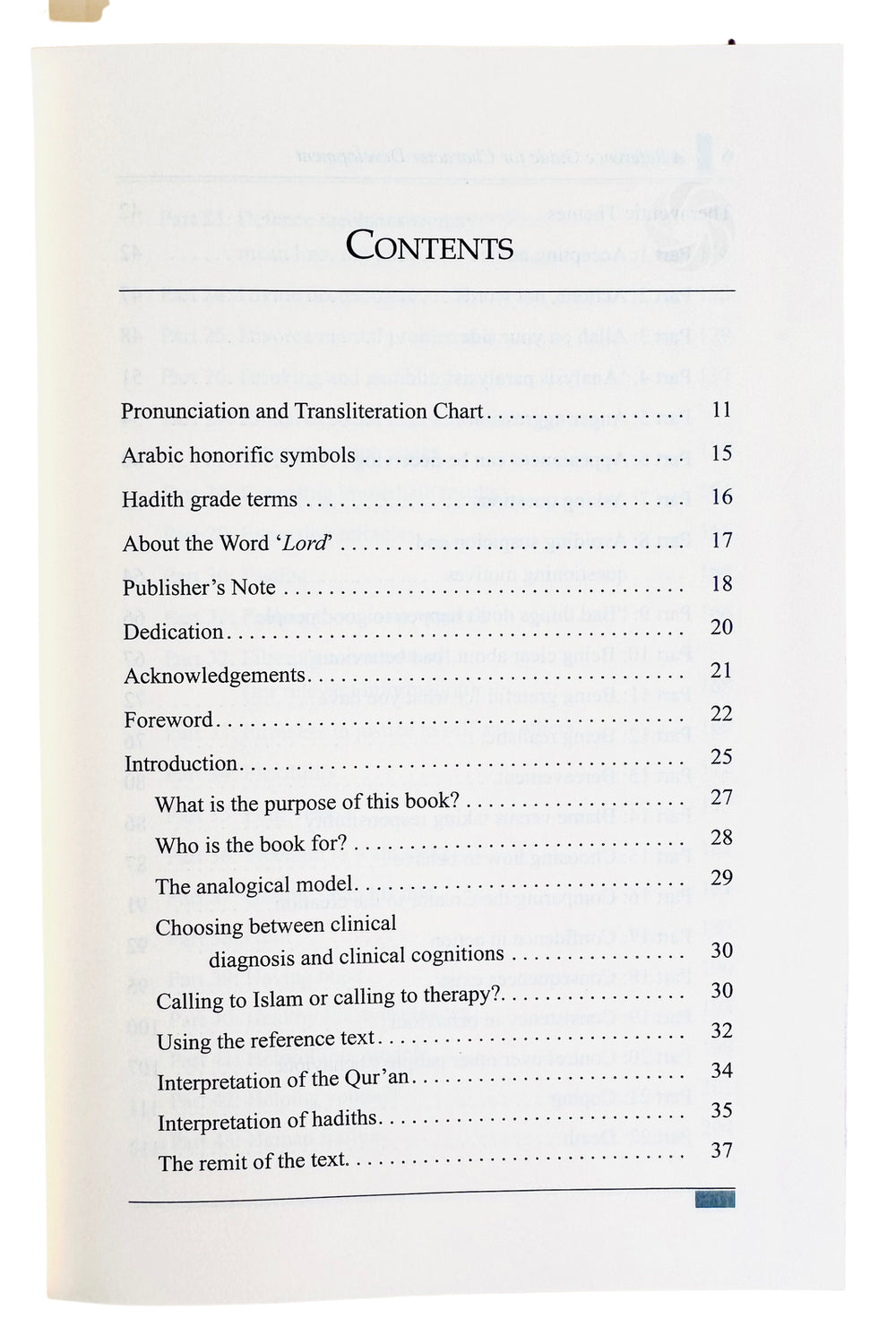
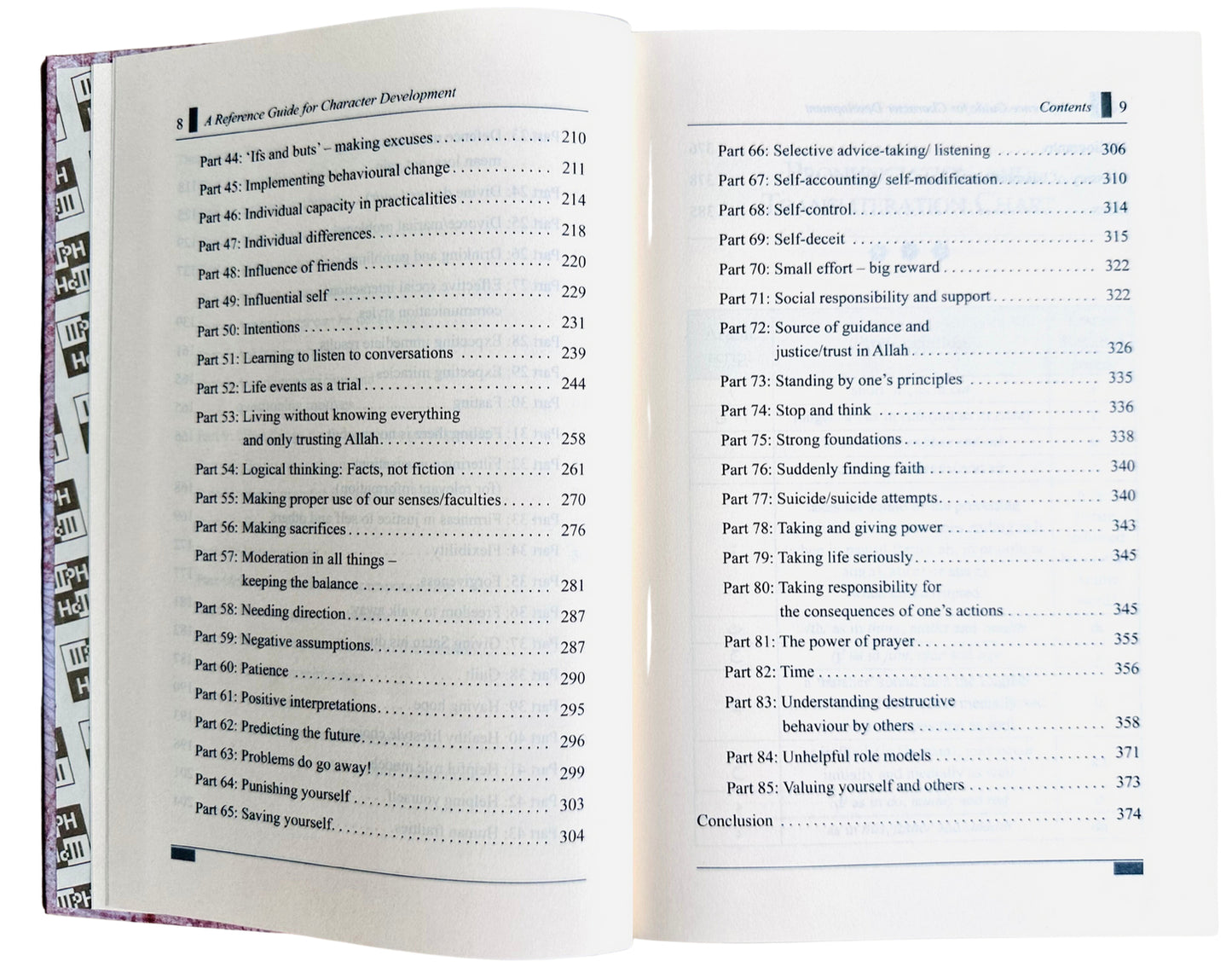
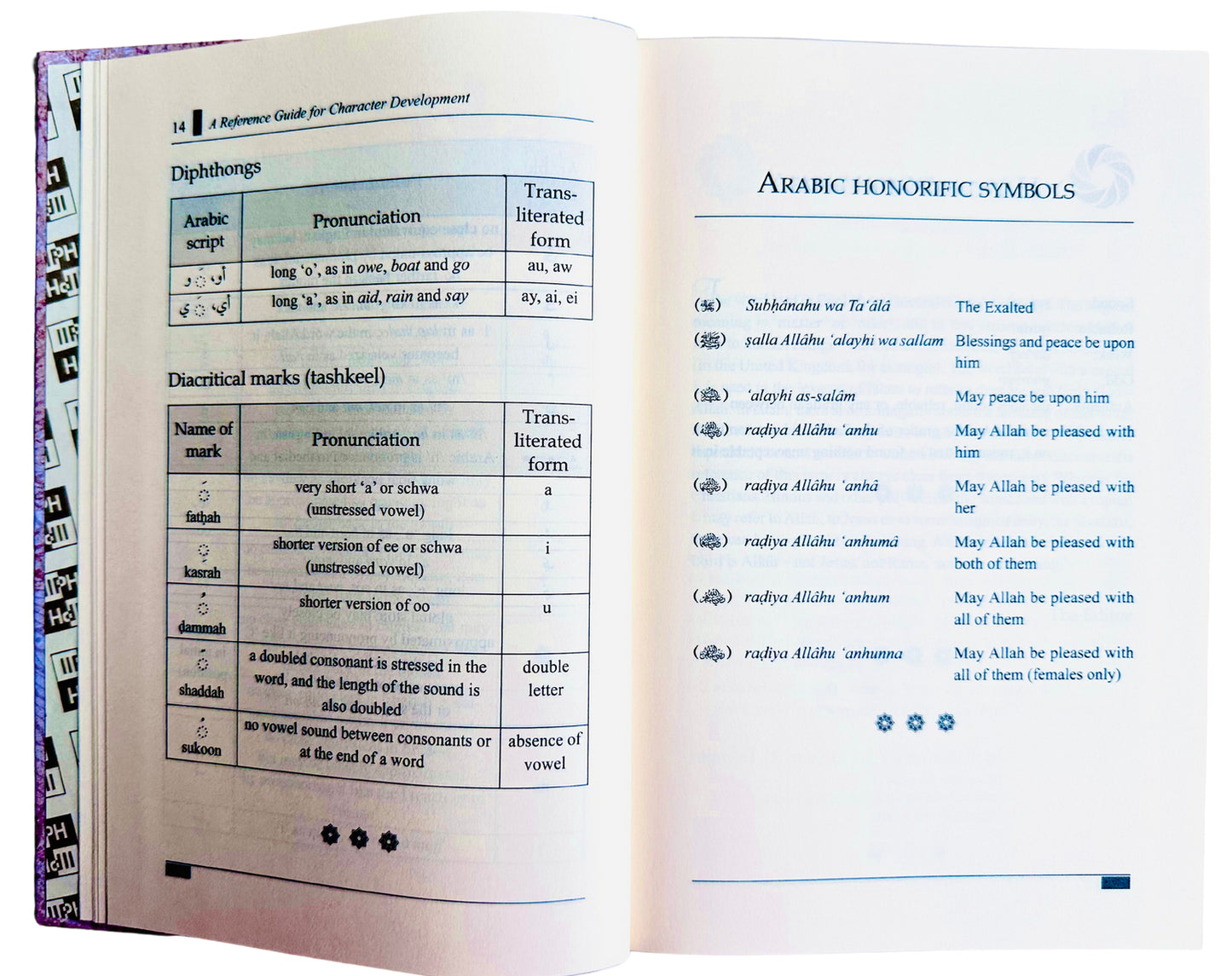
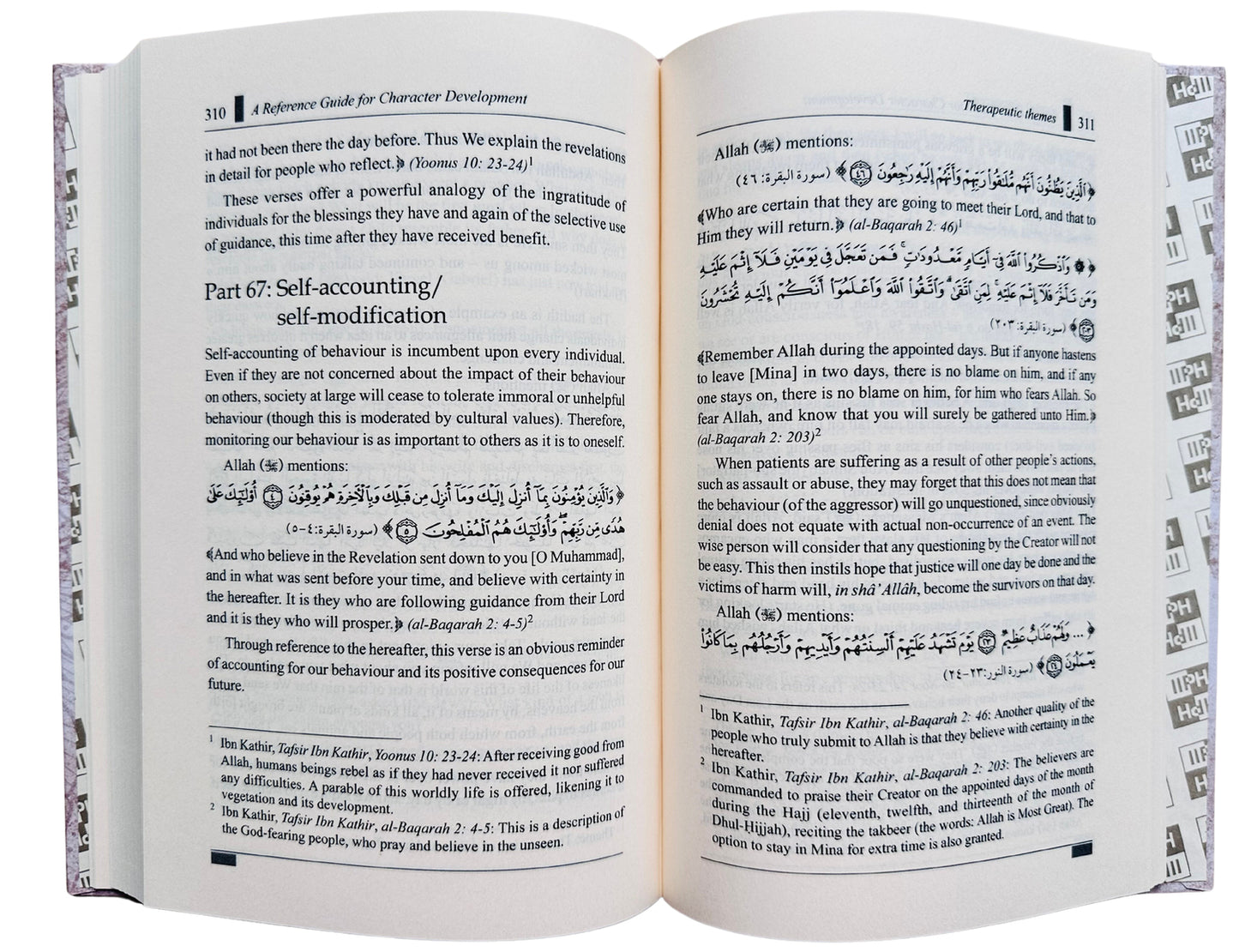
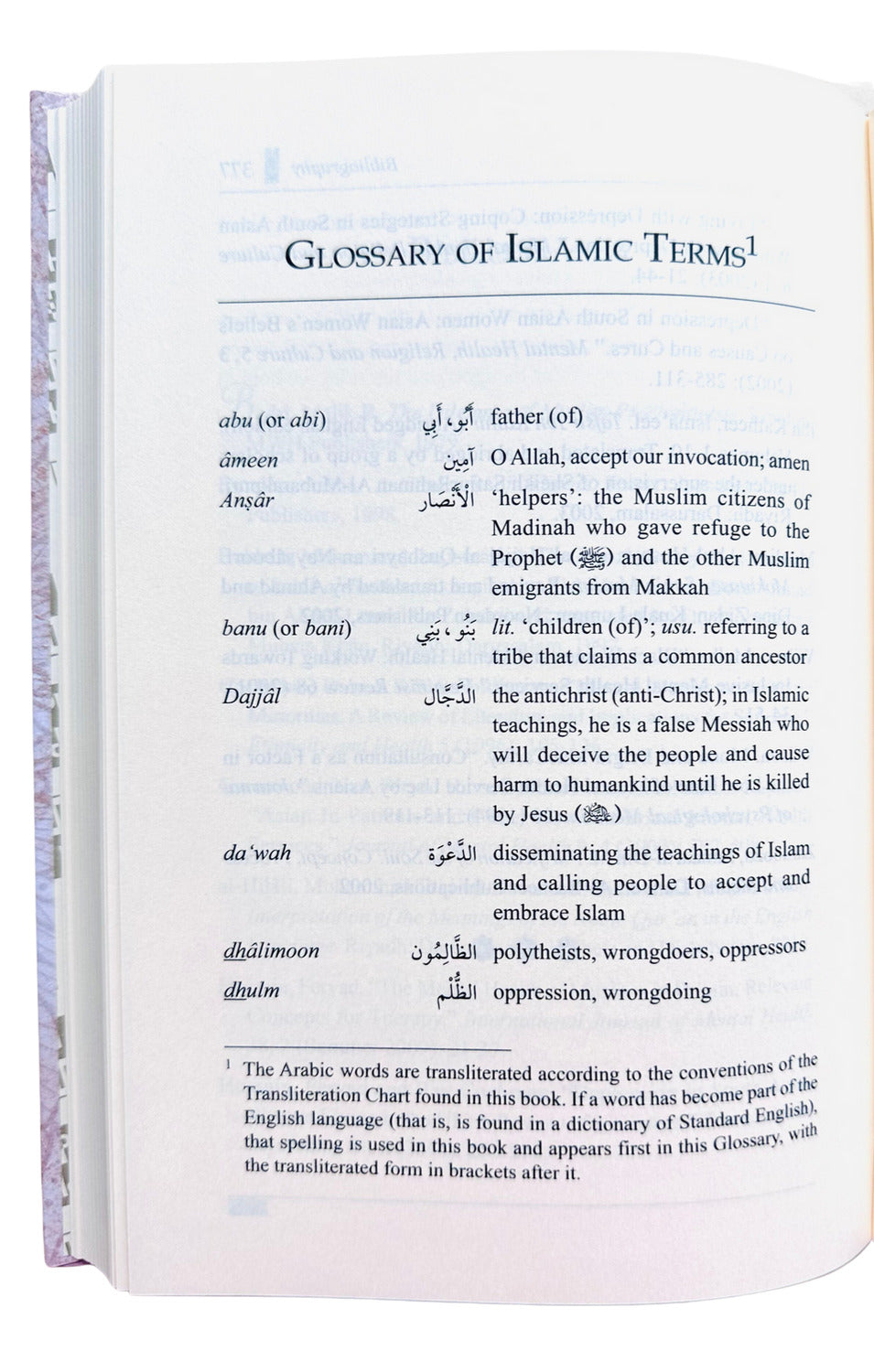
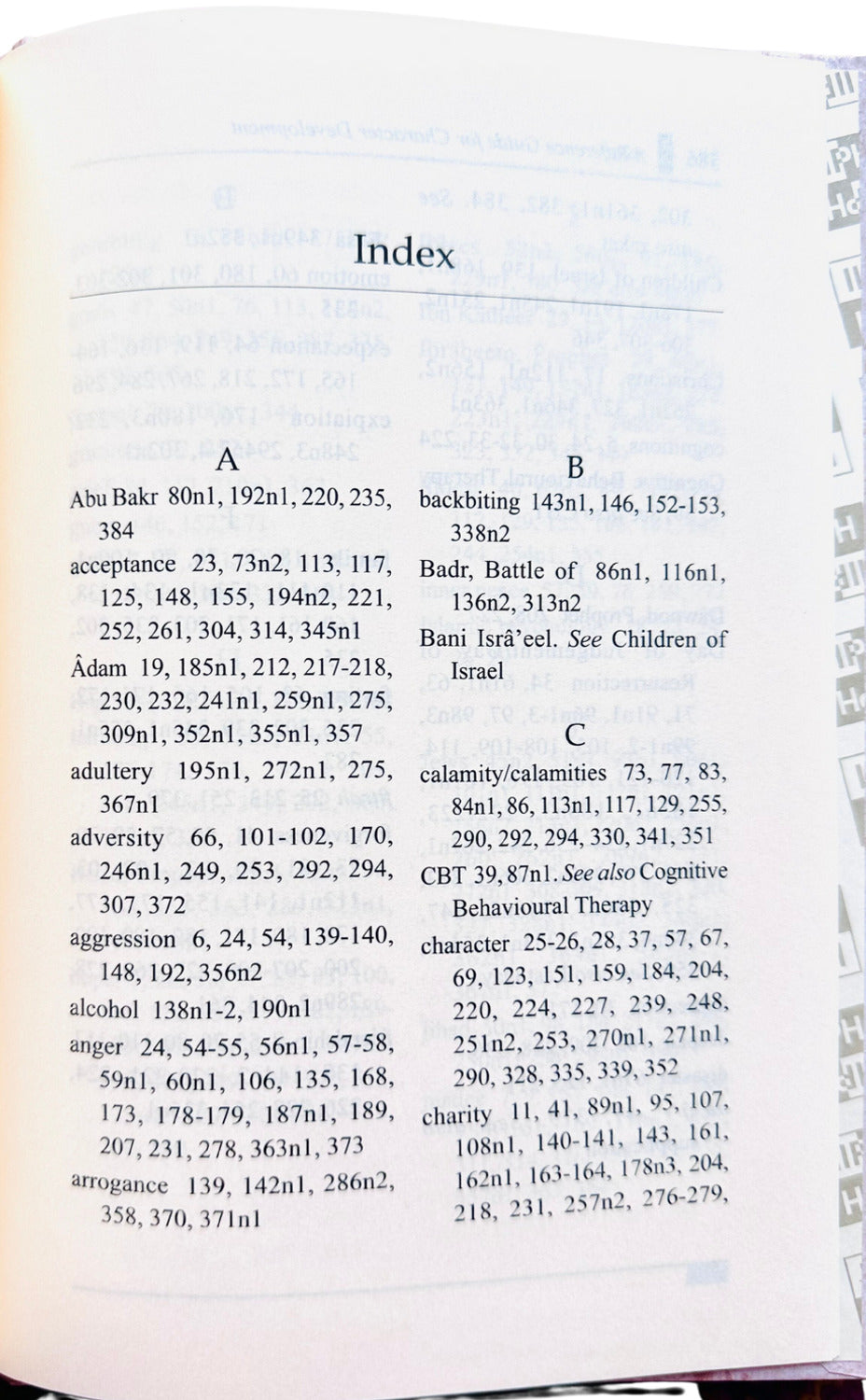
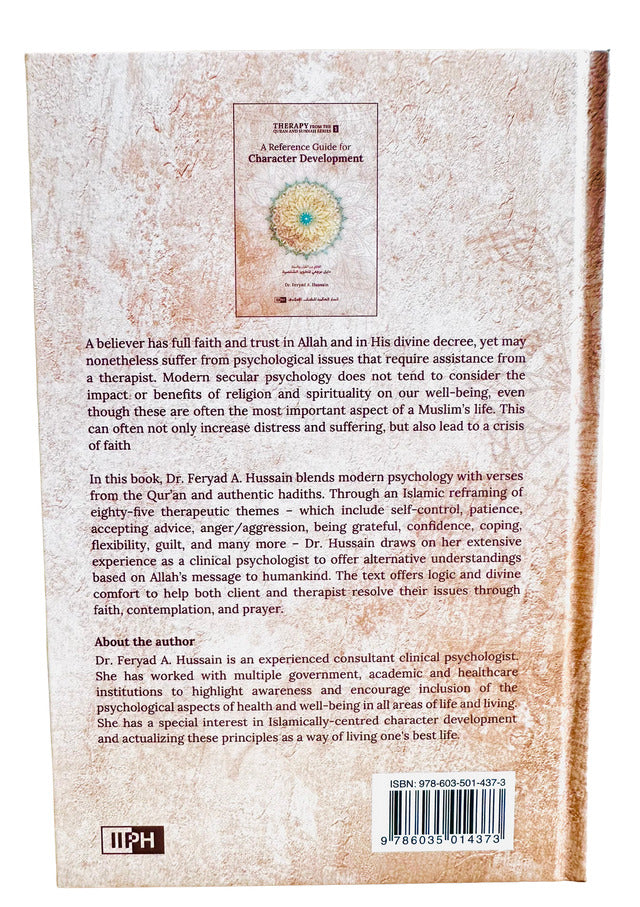
Collapsible content
Description of Book
A Reference Guide for Character Development (Therapy from Quran and Sunnah-1) by Dr Feryad A Hussain
In Managing Your Emotions (Therapy from Quran and Sunnah-1), Dr. Feryad A. Hussain integrates modern psychological principles with Islamic teachings to address emotional struggles. Despite a believer’s deep faith and trust in Allah’s divine will, they may still encounter psychological challenges requiring professional help. Traditional secular psychology often overlooks the role of spirituality and religion in mental health, even though these elements are vital for a Muslim's well-being. This can sometimes lead to heightened distress or even a crisis of faith. Dr. Hussain blends 85 therapeutic themes—ranging from self-control, patience, and gratitude to anger management, flexibility, and guilt—with Quranic verses and authentic hadiths. Drawing from her clinical psychology experience, she presents a unique, Islamically reframed approach to therapy, helping clients navigate their issues by relying on faith, reflection, and prayer. This book aims to offer both logical insights and divine comfort, guiding readers toward healing through spiritual and psychological understanding.
Publisher
IIPH (International Islamic Publishing House)
Author
- Dr Feryad A Hussain
Sample Pages - Content
Page:01
THERAPY FROM THE
QURAN AND SUNNAH SERIES
1
A Reference Guide for Character Development
العلاج من القرآن والسنة
لتطوير الشخصية دليل مرجعي
Dr. Feryad A. Hussain
الدار العالمية للكتاب الإسلامي 11PM
Page:02
H
PH
Hall
IIP
H
IPH Hall
H
THERAPY FROM THE QUR'AN AND SUNNAH SERIES
1
HALIA
JORDREM FROM CHT JODAS TROM THE
A Reference Guide for
Character Development
PH
dll
ПРИ
Title: A Reference Guide for Character Development
Author: Dr. Feryad A. Hussain
English Edition 1 (2023)
Layout Design: IIPH
دليل مرجعي لتطوير الشخصية
IIPH
Dr. Feryad A. Hussain
الدار العالمية للكتاب الإسلامي
International Islamic Publishing House
Page:03
CONTENTS
Pronunciation and Transliteration Chart...
Arabic honorific symbols.
Hadith grade terms
About the Word 'Lord'
Publisher's Note
Dedication.
Acknowledgements.
Foreword..
Introduction..
What is the purpose of this book?
Who is the book for?
The analogical model..
Choosing between clinical
diagnosis and clinical cognitions
Calling to Islam or calling to therapy?. Using the reference text. Interpretation of the Qur'an. Interpretation of hadiths.
The remit of the text..
Page:04
8
A Reference Guide for Character Development
single not Contents 9
Part 44: 'Ifs and buts' - making excuses..
210
H
Part 45: Implementing behavioural change..
Part 66: Selective advice-taking/ listening
306
211
Part 46: Individual capacity in practicalities......
Part 67: Self-accounting/ self-modification.
310
214
288 Part 68: Self-control..
314
PH Hall
Part 47: Individual differences..
218
Part 69: Self-deceit
315
Part 48: Influence of friends
220
Part 70: Small effort - big reward.
322
Part 49: Influential self
229
Part 71: Social responsibility and support.
322
IIP
Part 50: Intentions.
231
Part 72: Source of guidance and
Part 51: Learning to listen to conversations
239
justice/trust in Allah..
326
Part 52: Life events as a trial.
244
Part 73: Standing by one's principles
335
Part 53: Living without knowing everything and only trusting Allah..
Part 74: Stop and think
336
258
Part 75: Strong foundations...
338
Part 54: Logical thinking: Facts, not fiction ..........
261
Part 76: Suddenly finding faith
340
H
Part 55: Making proper use of our senses/faculties..
270
IPH
Hdl
Part 56: Making sacrifices..
Part 57: Moderation in all things - keeping the balance
Part 58: Needing direction..
Part 77: Suicide/suicide attempts.
340
e of soften mea
276
Part 78: Taking and giving power
343
Part 79: Taking life seriously.
345
281
Part 80: Taking responsibility for
287
the consequences of one's actions
345
Part 59: Negative assumptions.
287
Part 81: The power of prayer..
355
Part 60: Patience
290
Part 82: Time..
356
Part 61: Positive interpretations.
295
Part 83: Understanding destructive
Part 62: Predicting the future.
behaviour by others
358
PH
dll
UPH
Part 65: Saving yourself..
Part 64: Punishing yourself..
Part 63: Problems do go away!
296
Part 84: Unhelpful role models
371
299
Part 85: Valuing yourself and others.
373
303
Conclusion
374
304
Page:05
PH Hal
H ੪॥
IPH
Hd
PH
dll
PH
14
A Reference Guide for Character Development
Diphthongs
Arabic
Pronunciation
script
Trans-
literated form
ARABIC HONORIFIC SYMBOLS
أو و
أي، ي
long 'o', as in owe, boat and go long 'a', as in aid, rain and say
au, aw
ay, ai, ei
()
Subhanahu wa Ta'âlâ
The Exalted
(*) şalla Allahu 'alayhi wa sallam Blessings and peace be upon him
Diacritical marks (tashkeel)
Name of
Pronunciation
mark
Trans- literated form
() 'alayhi as-salâm () radiya Allahu 'anhu
May peace be upon him
May Allah be pleased with him
fathah
very short 'a' or schwa (unstressed vowel)
a
() radiya Allahu 'anhâ
May Allah be pleased with
shorter version of ee or schwa
i
kasrah
(unstressed vowel)
shorter version of oo
u
dammah
shaddah
a doubled consonant is stressed in the word, and the length of the sound is also doubled
double
() radiya Allahu 'anhuma
) radiya Allahu 'anhum
() radiya Allahu 'anhunna
her
May Allah be pleased with both of them
May Allah be pleased with all of them
May Allah be pleased with all of them (females only)
letter
sukoon
no vowel sound between consonants or absence of
at the end of a word
vowel
Page:06
310
A Reference Guide for Character Development
it had not been there the day before. Thus We explain the revelations
in detail for people who reflect. (Yoonus 10: 23-24)1
These verses offer a powerful analogy of the ingratitude of individuals for the blessings they have and again of the selective use
of guidance, this time after they have received benefit.
Part 67: Self-accounting/
self-modification
Self-accounting of behaviour is incumbent upon every individual. Even if they are not concerned about the impact of their behaviour on others, society at large will cease to tolerate immoral or unhelpful behaviour (though this is moderated by cultural values). Therefore, monitoring our behaviour is as important to others as it is to oneself. Allah () mentions:
وَالَّذِينَ يُؤْمِنُونَ بِمَا أُنزِلَ إِلَيْكَ وَمَا أُنزِلَ مِن قَبْلِكَ وَبِالْآخِرَةِ هُمْ يُوقِنُونَ أُولَبِكَ عَلَى هُدًى مِن رَّبِّهِمْ وَأُوْلَبِكَ هُمُ الْمُفْلِحُونَ ﴾ (سورة البقرة : ٤ - ٥)
And who believe in the Revelation sent down to you [O Muhammad], and in what was sent before your time, and believe with certainty in the hereafter. It is they who are following guidance from their Lord and it is they who will prosper. (al-Baqarah 2: 4-5)2
Through reference to the hereafter, this verse is an obvious reminder of accounting for our behaviour and its positive consequences for our
future.
1Ibn Kathir, Tafsir Ibn Kathir, Yoonus 10: 23-24: After receiving good from Allah, humans beings rebel as if they had never received it nor suffered any difficulties. A parable of this worldly life is offered, likening it to
vegetation and its development.
Ibn Kathir, Tafsir Ibn Kathir, al-Baqarah 2: 4-5: This is a description of the God-fearing people, who pray and believe in the unseen.
Allah (3) mentions:
Therapeutic themes
Hall
311
IP
Но
الَّذِينَ يَظُنُّونَ أَنَّهُم مُلَقُوا رَتِهِمْ وَأَنَّهُمْ إِلَيْهِ رَاجِعُونَ )
(سورة البقرة: ٤٦)
Who are certain that they are going to meet their Lord, and that to Him they will return.» (al-Baqarah 2: 46)
وَاذْكُرُوا اللَّهَ فِي أَيَّامٍ مَعْدُودَاتٍ فَمَن تَعَجَّلَ فِي يَوْمَيْنِ فَلَا إِثْمَ عَلَيْهِ وَمَن تَأَخَرَ فَلَا إِثْمَ عَلَيْهِ لِمَنِ اتَّقَى وَاتَّقُوا اللَّهَ وَاعْلَمُوا أَنَّكُمْ إِلَيْهِ تُحْشَرُونَ
(سورة البقرة: ٢٠٣)
Remember Allah during the appointed days. But if anyone hastens to leave [Mina] in two days, there is no blame on him, and if any one stays on, there is no blame on him, for him who fears Allah. So fear Allah, and know that you will surely be gathered unto Him. (al-Baqarah 2: 203)2
When patients are suffering as a result of other people's actions, such as assault or abuse, they may forget that this does not mean that the behaviour (of the aggressor) will go unquestioned, since obviously denial does not equate with actual non-occurrence of an event. The wise person will consider that any questioning by the Creator will not be easy. This then instils hope that justice will one day be done and the victims of harm will, in sha' Allah, become the survivors on that day. Allah (3) mentions:
... وَقَهُمْ عَذَابٌ عَظِيمٌ يَوْمَ تَشْهَدُ عَلَيْهِمْ أَلْسِنَتُهُمْ وَأَيْدِيهِمْ وَأَرْجُلُهُم بِمَا كَانُوا
يعْمَلُونَ ) (سورة النور : ٢٣-٢٤)
hereafter.
Ibn Kathir, Tafsir Ibn Kathir, al-Baqarah 2: 46: Another quality of the people who truly submit to Allah is that they believe with certainty in the 2 Ibn Kathir, Tafsir Ibn Kathir, al-Baqarah 2: 203: The believers are commanded to praise their Creator on the appointed days of the month during the Hajj (eleventh, twelfth, and thirteenth of the month of Dhul-Hijjah), reciting the takbeer (the words: Allah is Most Great). The option to stay in Mina for extra time is also granted.
PH
ΠΡΗ Hal
IIR H
PH
Adil
A
IPH
Hd
H
Page:07
GLOSSARY OF ISLAMIC TERMS1
116-283 (500)
abu (or abi) âmeen
Anşâr
brie
banu (or bani)
Dajjal
da'wah
dhâlimoon dhulm
(father (of أبو ، أبي
ހޅ
O Allah, accept our invocation; amen helpers': the Muslim citizens of Madinah who gave refuge to the Prophet () and the other Muslim emigrants from Makkah
lit. children (of)'; usu. referring to a atribe that claims a common ancestor JJ the antichrist (anti-Christ); in Islamic
teachings, he is a false Messiah who will deceive the people and cause harm to humankind until he is killed by Jesus ()
disseminating the teachings of Islam الدعوة
and calling people to accept and
embrace Islam
JÚ polytheists, wrongdoers, oppressors
oppression, wrongdoing
1 The Arabic words are transliterated according to the conventions of the Transliteration Chart found in this book. If a word has become part of the English language (that is, is found in a dictionary of Standard English), that spelling is used in this book and appears first in this Glossary, with
the transliterated form in brackets after it.
Page:08
Index
081.00 nottoms
Ho
STI 201 boltaiqxo
Apes E0BAS
Abu Bakr 80n1, 192n1, 220, 235, 384 acceptance 23, 73n2, 113, 117,
125, 148, 155, 1942, 221, 252, 261, 304, 314, 345n1 Adam 19, 185n1, 212, 217-218,
230, 232, 241n1, 259n1, 275, 309n1, 352n1, 355n1, 357 adultery 195n1, 272n1, 275, 367nlesars
adversity 66, 101-102, 170,
246n1, 249, 253, 292, 294, 307, 372
B
backbiting 143n1, 146, 152-153, 338n2
Badr, Battle of 86n1, 116n1,
136n2, 313n2
Bani Isrâ'eel. See Children of Israel
C
calamity/calamities 73, 77, 83, 84n1, 86, 113n1, 117, 129, 255, 290, 292, 294, 330, 341, 351 CBT 39, 87n1. See also Cognitive
Behavioural Therapy
aggression 6, 24, 54, 139-140, character 25-26, 28, 37, 57, 67,
148, 192, 356n2
alcohol 138n1-2, 190n1
anger 24, 54-55, 56n1, 57-58, 59n1, 60n1, 106, 135, 168, 173, 178-179, 187n1, 189, 207, 231, 278, 363n1, 373 arrogance 139, 142n1, 286n2, 358, 370, 371nl
69, 123, 151, 159, 184, 204, 220, 224, 227, 239, 248, 251n2, 253, 270n1, 271n1, 290, 328, 335, 339, 352 charity 11, 41, 89n1, 95, 107,
108n1, 140-141, 143, 161, 162n1, 163-164, 178n3, 204, 218, 231, 257n2, 276-279,
Page:09
THERAPY
QUAN AND SERIES
A Reference Guide for Character Development
A believer has full faith and trust in Allah and in His divine decree, yet may nonetheless suffer from psychological issues that require assistance from a therapist. Modern secular psychology does not tend to consider the impact or benefits of religion and spirituality on our well-being, even though these are often the most important aspect of a Muslim's life. This can often not only increase distress and suffering, but also lead to a crisis of faith
-
In this book, Dr. Feryad A. Hussain blends modern psychology with verses from the Qur'an and authentic hadiths. Through an Islamic reframing of eighty-five therapeutic themes which include self-control, patience, accepting advice, anger/aggression, being grateful, confidence, coping, flexibility, guilt, and many more Dr. Hussain draws on her extensive experience as a clinical psychologist to offer alternative understandings based on Allah's message to humankind. The text offers logic and divine comfort to help both client and therapist resolve their issues through faith, contemplation, and prayer.
About the author
Dr. Feryad A. Hussain is an experienced consultant clinical psychologist. She has worked with multiple government, academic and healthcare institutions to highlight awareness and encourage inclusion of the psychological aspects of health and well-being in all areas of life and living. She has a special interest in Islamically-centred character development and actualizing these principles as a way of living one's best life.
IIPH
ISBN: 978-603-501-437-3
9 786035 014373
Dr Feryad A Hussain
Dr. Feryad A. Hussain is a clinical psychologist known for her work integrating Islamic teachings with modern psychological practices. She has authored books like Therapy from the Quran and Ahadith and A Reference Guide for Character Development, which offer Islamic perspectives on addressing psychological challenges. These works combine Quranic verses and Hadith with therapeutic approaches to tackle issues such as anger, patience, self-control, and emotional well-being.









